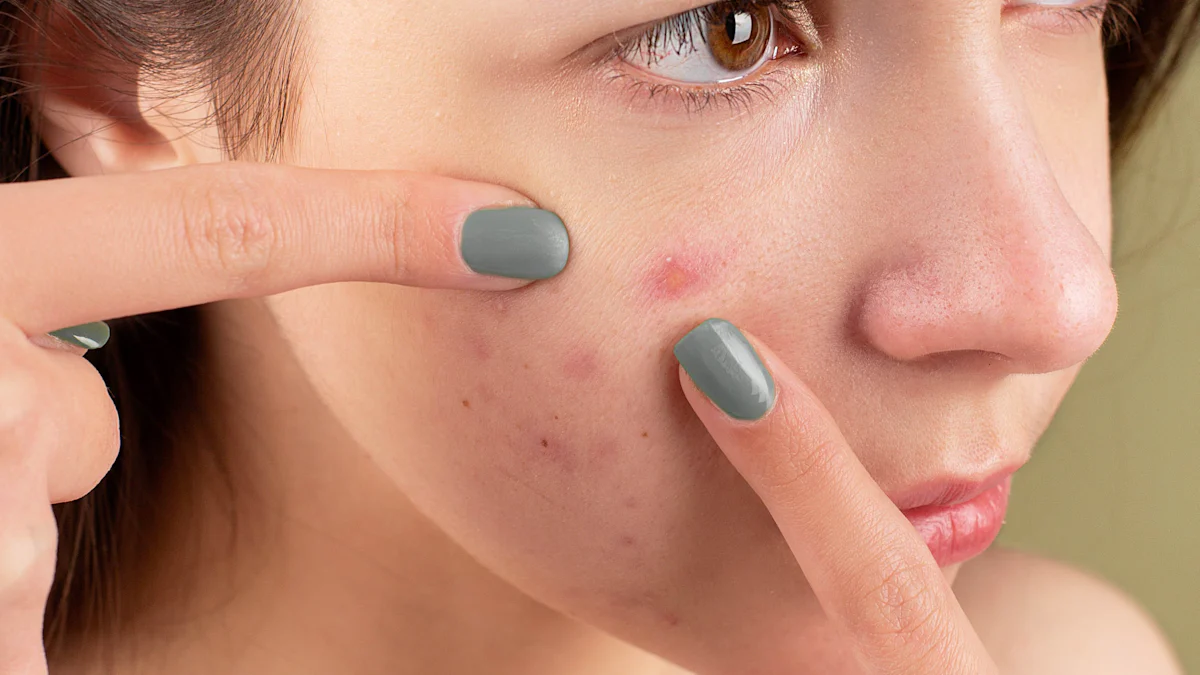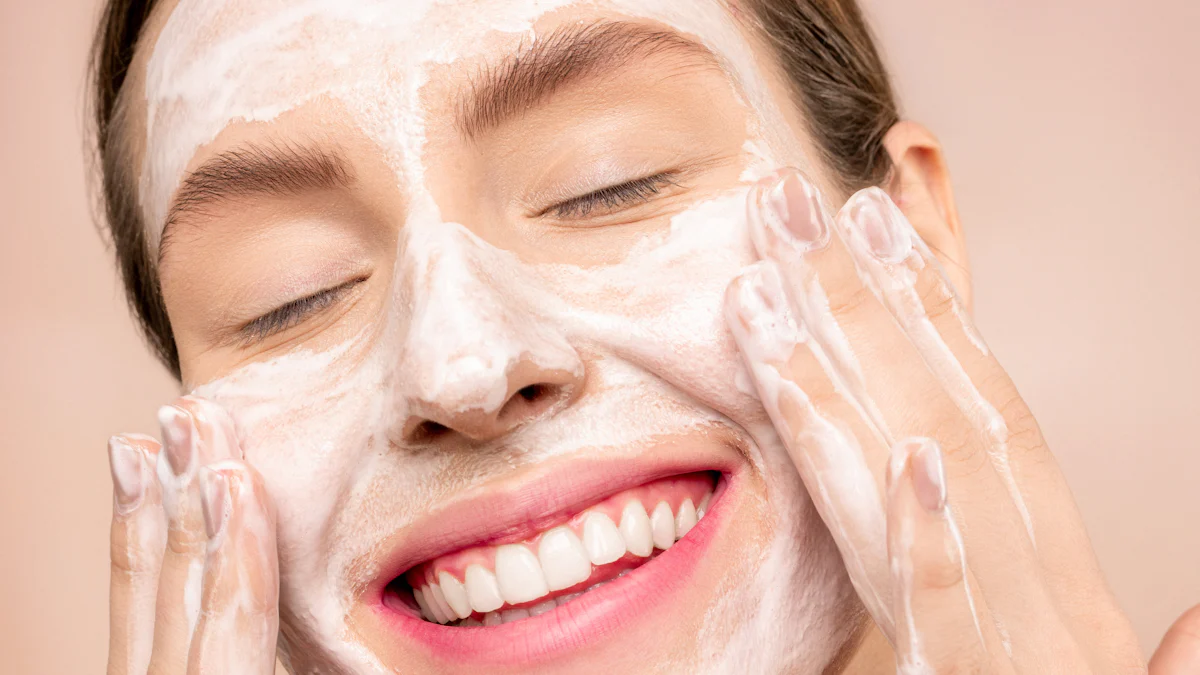
Hormones play a crucial role in skin health, influencing various aspects such as oil production, inflammation, and collagen synthesis. Understanding the impact of estrogen, progesterone, and androgens on your skin type is essential for maintaining its health and appearance. This blog will delve into how these hormones affect your skin at different life stages, from puberty to menopause, and how a tailored skincare routine can help manage these changes.
Acne and Hormonal Imbalances

When it comes to skin health, hormonal imbalances can significantly impact the occurrence of acne. The role of androgens in stimulating the sebaceous glands to increase sebum production is crucial. This excess sebum can lead to clogged pores, resulting in acne outbreaks. Understanding how estrogen and progesterone influence acne development is essential.
Expert opinions vary regarding hormonal acne. Dr. Sohere Roked, a leading expert in bio-identical hormone therapy, emphasizes the importance of balancing hormones to manage breakouts effectively. She highlights that imbalances in estrogen and progesterone levels before menstruation can disrupt skin balance, potentially causing acne flare-ups.
Diana notes that hormonal acne typically affects areas like the T-Zone, forehead, nose, and chin due to increased sebum production. Breakouts during specific times of the menstrual cycle are common and may last a couple of weeks before subsiding. This cyclical pattern indicates a strong link between hormonal fluctuations and acne development.
While some sources suggest hormones do not play a significant role in adult acne, underlying medical conditions may exacerbate hormonal imbalances leading to skin issues. Understanding how hormones like estrogen, progesterone, and androgens affect sebum production is vital for managing hormonal acne effectively.
Managing Hormonal Acne
To address hormonal acne effectively, adopting a tailored skincare routine is key. Proper cleansing helps remove excess oil without stripping the skin's natural moisture barrier. Incorporating non-comedogenic products can prevent pore blockages that contribute to acne formation.
Medical treatments such as topical retinoids or oral medications may be recommended by dermatologists for severe cases of hormonal acne. These treatments target inflammation and regulate sebum production to improve skin condition over time.
Balancing hormone levels through medication or hormone replacement therapy under healthcare professional guidance can help manage hormonal imbalances contributing to acne breakouts effectively.
The Menstrual Cycle and Skin Health

Phases of the Menstrual Cycle
The menstrual cycle consists of distinct phases that impact skin health differently. During the follicular phase, which occurs before ovulation, estrogen levels rise, leading to increased skin thickness and hydration. This phase promotes collagen synthesis, enhancing skin elasticity and barrier function. In contrast, the luteal phase, following ovulation, is characterized by higher progesterone levels. Progesterone peaks during this phase are associated with various dermatoses like acne, psoriasis, atopic eczema, and irritant dermatitis.
Skin Changes During the Cycle
Throughout the menstrual cycle, women may experience fluctuations in skin condition due to hormonal variations. Acne flare-ups are common during specific stages of the cycle, often linked to increased sebum production influenced by hormonal shifts. These breakouts can be managed through targeted skincare routines and hormone-balancing strategies.
Dry and oily skin manifestations can also occur as a result of hormonal changes. While some individuals may experience dryness due to decreased sebum production in certain phases, others might notice an increase in oiliness related to hormonal imbalances. Understanding these fluctuations can help tailor skincare practices accordingly to address specific concerns at different points in the menstrual cycle.
The interplay between hormones and the menstrual cycle underscores the dynamic nature of skin health regulation in women. By recognizing these patterns and their effects on the skin, individuals can adapt their skincare routines to support overall skin well-being throughout each phase of the menstrual cycle.
Skin Health During Life Stages
Puberty and Skin Changes
During puberty, hormonal fluctuations can lead to significant changes in skin health. The surge in hormones triggers an increase in oil production, which can result in a shiny complexion and potential acne breakouts. Understanding these shifts is crucial for adapting skincare routines to address emerging concerns effectively.
-
Increased Oil Production
-
Hormonal changes during puberty stimulate the sebaceous glands, leading to heightened oil secretion.
-
Excess oil on the skin's surface can clog pores, contributing to the development of acne.
-
Managing oil production through gentle cleansing and non-comedogenic products is essential for maintaining clear skin.
-
Acne Development
-
The interaction between hormones and sebum production often manifests as acne during puberty.
-
Acne development may vary based on individual hormone levels and genetic predispositions.
-
Tailoring skincare routines to manage acne symptoms can help promote healthier skin during this transitional phase.
Pregnancy and Skin Health
Pregnancy introduces a unique set of hormonal changes that can impact skin health differently for each individual. Understanding these shifts is essential for addressing common skin issues associated with pregnancy.
Hormonal Shifts:
Pregnancy hormones like estrogen and progesterone fluctuate significantly, influencing various aspects of skin function.
These hormonal shifts can lead to changes in skin texture, moisture levels, and overall appearance.
Adapting skincare practices to accommodate these fluctuations can help maintain skin health throughout pregnancy.
Common Skin Issues
-
Pregnant individuals may experience a range of dermatological concerns, including melasma (skin pigmentation), stretch marks, and increased sensitivity.
-
Hormonal imbalances during pregnancy can exacerbate existing skin conditions or trigger new ones.
-
Consultation with healthcare professionals for personalized skincare recommendations is advisable to address specific skin issues effectively.
Menopause and Skin Health
As women approach menopause, declining estrogen levels have profound effects on skin health. These hormonal changes impact collagen synthesis, elasticity, and overall skin condition.
-
Decline in Estrogen
-
Reduced estrogen levels during menopause contribute to decreased collagen production and skin thickness.
-
The decline in estrogen leads to drier, thinner skin prone to wrinkles and sagging.
-
Maintaining adequate moisture levels through hydrating skincare products becomes crucial during this stage.
-
Impact on Collagen and Elasticity
-
Estrogen deprivation accelerates the aging process by diminishing collagen synthesis and impairing elastin function.
-
Loss of collagen results in reduced skin firmness, elasticity, and resilience over time.
-
Addressing these changes through targeted skincare interventions can help support healthy aging of the skin.
Hormones play a pivotal role in skin health, influencing various aspects such as oil production, inflammation, and collagen synthesis. Understanding the impact of estrogen, progesterone, and androgens on skin is crucial for maintaining its vitality. Managing hormonal changes effectively through tailored skincare routines is essential for promoting healthy skin at every life stage.
Suggestions for future developments include advancing research on personalized skincare solutions that target specific hormonal imbalances. Recommendations emphasize consulting healthcare professionals to address individual skin concerns and optimize overall skin well-being. By prioritizing hormone management, individuals can unlock the secrets to radiant and healthy skin throughout their lives.
See Also
Diet's Influence on Your Skin: How Food Impacts Radiance
Harnessing Retinol's Strength: Boost Skin Vitality with Vitamin A
Expert Skincare Advice: Insider Tips from Dermatologists

